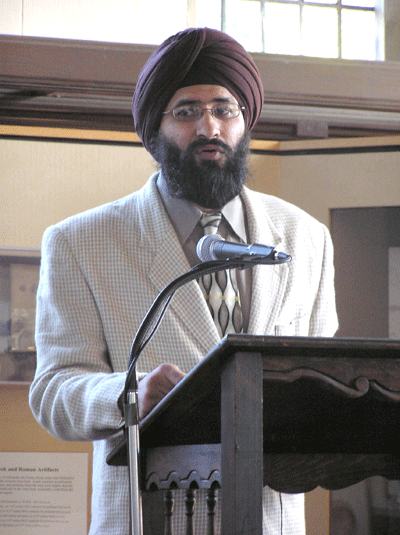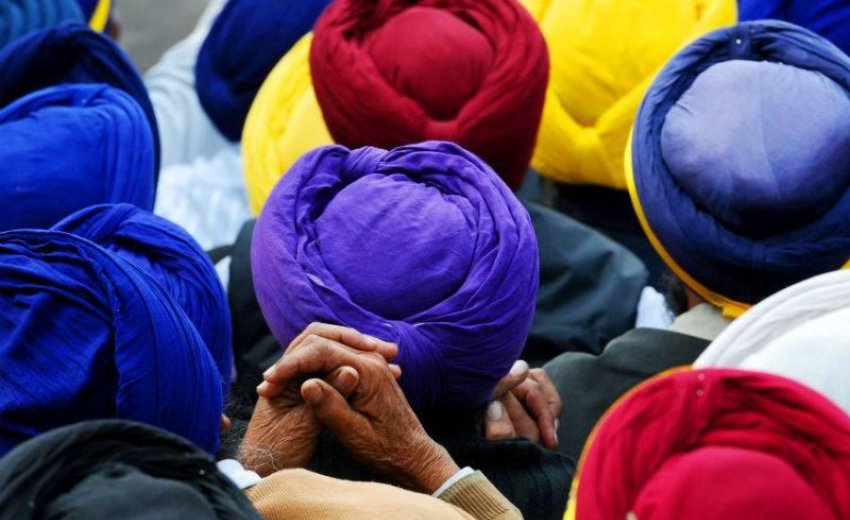 Jaideep Singh, the new endowed chair-holder of Sikh and Punjabi Studies at the California State University, East Bay, is the first to focus on community outreach.
Jaideep Singh, the new endowed chair-holder of Sikh and Punjabi Studies at the California State University, East Bay, is the first to focus on community outreach.
An expert in comparative ethnic studies, Jaideep Singh was formally installed on Jan. 5 at the university's Department of Ethnic Studies.
He is the first American-educated endowed chair-holder in Sikh studies in the country. And he is the first to work on issues facing the Sikh American community with his research on the racial and religious bigotry that followed the 9/11 attacks, which he calls the "racialization of religious identity."
"It's an activist job," he said. "My work is to develop a field of Sikh American studies." No one has been trained in the affect on minority communities of white supremacists and Christian supremacists, he said. No one takes this seriously.
His exposure of bigotry will not stop with white racisism. He is equally critical of the class bias within the Sikh community, the ignorance by the old and rich immigrants of the new and poor immigrants.
"It's a damning indictment for the wealthy Sikhs," he said. "They will go to a homeless kitchen, but they won't help their brother."
When taxi drivers were targeted or killed after 9/11, "what did they do?"
Jaideep Singh's work will not only expose the bigotry within and outside the community, but will reach out to the underprivileged by recruiting more students, Sikh and non-Sikh, from the rural parts of the state who traditionally have been underrepresented at universities. These are the children of taxi drivers, 7-11 convenience store workers and farm laborers, he said.
Jaideep Singh called his new appointment "a dream job" because he can help some of these students find financial aid, and mentor and guide them through college.
His new position seems to fit into the natural progression of his career. A self-proclaimed activist for more than 20 years, Jaideep Singh said his activism reaches back to 1996, when he and Manjit Singh co-founded the Sikh American Legal Defense and Education Fund, a Washington-based advocacy group, originally known as the Sikh Mediawatch and Resource Taskforce.
They had met two years earlier through a Khalsa email list and discovered they had a common vision of having an organization that would respond to the stereotypes in the news coverage about Sikhs, said Manjit Singh, chairman of the board at SALDEF.
The grass-roots volunteer effort is now a formal organization with a broader scope of legal and education assistance, and has representatives across the country. Jaideep Singh is expected to join the board next month.
"This is his natural field of work," Manjit Singh said of his friend's new appointment. "He has such a treasure trove of knowledge and wealth of background, I doubt there is anyone who comes close."
Jaideep Singh has earned three degrees from the University of California, Berkeley: a bachelor's in history, 1994; a master's in ethnic studies, 1994, and a doctorate in ethnic studies, 2008.
According to the department's news release, he was a visiting lecturer at several University of California campuses, including Berkeley, Davis, Los Angeles and Santa Barbara. He was also an adjunct lecturer in 2003 at California State University, East Bay, in the Department of Ethnic Studies, where he taught Introduction to Comparative Asian American Studies and a colloquium in Asian American history.
When the Dr. Ranjit Singh Sabharwal Chair in Sikh and Punjabi Studies was established in June 2007, Jaideep Singh was among 10 candidates from the United Kingdom, India and Berkeley, said Benjamin Bowser, former interim dean of the College of Letters, Arts, and Social Sciences, who served on the three-member search committee.
"But the best candidate was just up the road from us," he said.
The committee was interested in how much the candidates were engaged in the community. Part of the university's mission is to provide regional stewardship to local communities, encourage economic development and improve social life, he said. The beneficiary will be the Freemont community, next door to the main campus in Hayward.
"The Sikh community is very much interested in educational opportunities in business, economics, social and behavioral sciences, and having their culture and history as part of the curriculum," said Bowser, now chairman of the sociology and social services department.
This is the first endowed chair of its kind in the California State University system and the first of any endowed chair at the East Bay campus.
It honors Ranjit Singh, a mathematics professor at East Bay since
1968. He endowed the Sabharwal Family Scholarship Fund in 2003 for mathematics students, and hoped to endow a chair to explore the language, culture, politics and religion of his homeland, according to the department's news release.
Ranjit Singh was also instrumental in founding the gurdwaras in Fremont and Hayward, and watched them thrive as the Bay Area Sikh community grew from 20 families in the 1960s to more than 20,000 families, according to the news release.
After his death in July 2006, at 81, the Sabharwal family, the Palo Alto-based Sikh Foundation and others in the Sikh community raised $500,000 to endow the chair in his honor. More than 300 people contributed, with the donations ranging from small amounts to exceptionally generous amounts, according to the news release.
This is the third chair endowed by the Sikh Foundation, where Ranjit Singh was also a trustee. A fourth chair at the University of California, Santa Cruz, has not been filled yet. The other two are at the University of California, Riverside and Santa Barbara.
Endowed chair holders are full-time faculty members whose salaries are paid by their respective universities. The endowment provides a supplemental source of funds that the chair-holder can use for conferences, forums, research and community outreach. Universities benefit from endowments by attracting new faculty and students.
Note: Photo courtesy the University of California, East Bay.
